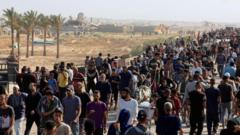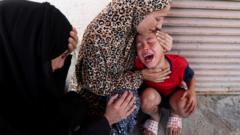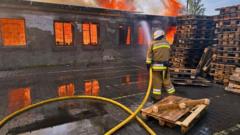An Israeli airstrike has tragically killed ten individuals, including six children, in central Gaza while they were waiting to collect water. The strike adds to the mounting humanitarian crisis in Gaza, with hospitals overwhelmed and civilian fatalities rising amid ongoing military operations.
Israeli Airstrike Claims Lives of Children in Gaza Water Distribution Queue

Israeli Airstrike Claims Lives of Children in Gaza Water Distribution Queue
A tragic airstrike in Gaza has resulted in fatalities among children and civilians as violence escalates in the region, prompting international humanitarian concerns.
In a devastating incident over the weekend, ten people, including six children, lost their lives in an Israeli airstrike while waiting to fill water containers in central Gaza. This tragedy unfolded at a water distribution point in al-Nuseirat refugee camp, where eyewitnesses reported that a drone targeted a crowd of civilians queuing with empty jerry cans next to a water tanker. Emergency service officials confirmed the victims were transported to al-Awda Hospital in Nuseirat, where 16 others, including seven children, received treatment for their injuries.
The attack has drawn attention to the deteriorating humanitarian crisis in Gaza, as the International Committee of the Red Cross (ICRC) reported treating an unprecedented number of mass casualties in its field hospital in Rafah. Over the past six weeks, the number of cases treated surpasses that of the entire prior year. Unverified footage circulating social media showed scenes of chaos, with bloodied children and lifeless bodies amidst the panic of residents rushing to assist the wounded utilizing private vehicles and makeshift transportation.
This airstrike was part of a broader escalation of Israeli aerial assaults across the Gaza Strip, with reports of 19 additional Palestinians killed in other airstrikes targeting residential buildings. The ICRC disclosed that its Rafah facility admitted 132 patients for gunshot wounds on Saturday, highlighting the overwhelming toll on civilians trying to access basic necessities amid ongoing violence.
Southern Gaza's Nasser hospital recently reported 24 deaths near an aid distribution site, a stark reminder of the lethal ramifications of conflict in areas designated for humanitarian assistance. The Israel Defense Forces (IDF) contended that there were no IDF-related injuries reported at this site, adding complexity to the situation as accusations of civilian harm mount.
The UN human rights office released data indicating 789 aid-related fatalities, many occurring around sites operated by the US and Israeli-backed Gaza Humanitarian Foundation, which have faced scrutiny over their internal operations and casualty reporting. The IDF has acknowledged incidents where civilians were inadvertently harmed and emphasized their ongoing efforts to reduce friction with the local population.
Amid this backdrop, the humanitarian conditions in Gaza have become critical, with over 57,882 deaths reported since the commencement of military operations following a Hamas cross-border attack on October 7, 2023. Displacement and destruction have ravaged the area, with more than 90% of homes reported damaged. Healthcare systems have already collapsed, and urgent shortages of essential supplies continue to exacerbate civilian suffering.
Despite a recent allowance of 75,000 litres of fuel into Gaza, the United Nations has warned that this quantity is insufficient to meet urgent needs. As hospitals face potential shutdowns due to fuel shortages, millions remain in dire conditions, underscoring the urgent need for humanitarian intervention and support in the besieged region.
The attack has drawn attention to the deteriorating humanitarian crisis in Gaza, as the International Committee of the Red Cross (ICRC) reported treating an unprecedented number of mass casualties in its field hospital in Rafah. Over the past six weeks, the number of cases treated surpasses that of the entire prior year. Unverified footage circulating social media showed scenes of chaos, with bloodied children and lifeless bodies amidst the panic of residents rushing to assist the wounded utilizing private vehicles and makeshift transportation.
This airstrike was part of a broader escalation of Israeli aerial assaults across the Gaza Strip, with reports of 19 additional Palestinians killed in other airstrikes targeting residential buildings. The ICRC disclosed that its Rafah facility admitted 132 patients for gunshot wounds on Saturday, highlighting the overwhelming toll on civilians trying to access basic necessities amid ongoing violence.
Southern Gaza's Nasser hospital recently reported 24 deaths near an aid distribution site, a stark reminder of the lethal ramifications of conflict in areas designated for humanitarian assistance. The Israel Defense Forces (IDF) contended that there were no IDF-related injuries reported at this site, adding complexity to the situation as accusations of civilian harm mount.
The UN human rights office released data indicating 789 aid-related fatalities, many occurring around sites operated by the US and Israeli-backed Gaza Humanitarian Foundation, which have faced scrutiny over their internal operations and casualty reporting. The IDF has acknowledged incidents where civilians were inadvertently harmed and emphasized their ongoing efforts to reduce friction with the local population.
Amid this backdrop, the humanitarian conditions in Gaza have become critical, with over 57,882 deaths reported since the commencement of military operations following a Hamas cross-border attack on October 7, 2023. Displacement and destruction have ravaged the area, with more than 90% of homes reported damaged. Healthcare systems have already collapsed, and urgent shortages of essential supplies continue to exacerbate civilian suffering.
Despite a recent allowance of 75,000 litres of fuel into Gaza, the United Nations has warned that this quantity is insufficient to meet urgent needs. As hospitals face potential shutdowns due to fuel shortages, millions remain in dire conditions, underscoring the urgent need for humanitarian intervention and support in the besieged region.





















